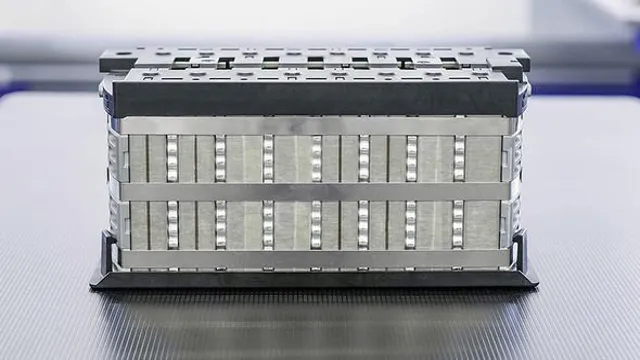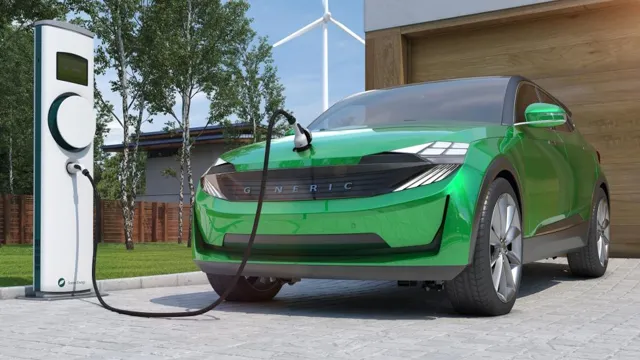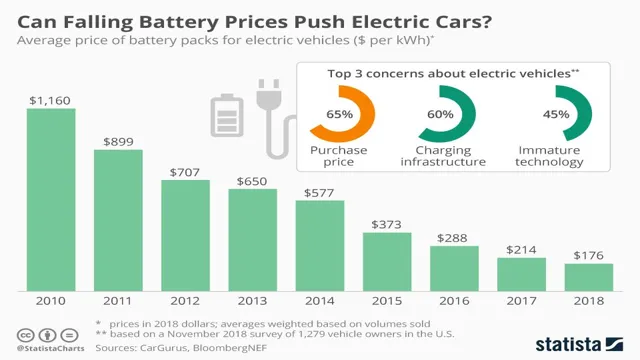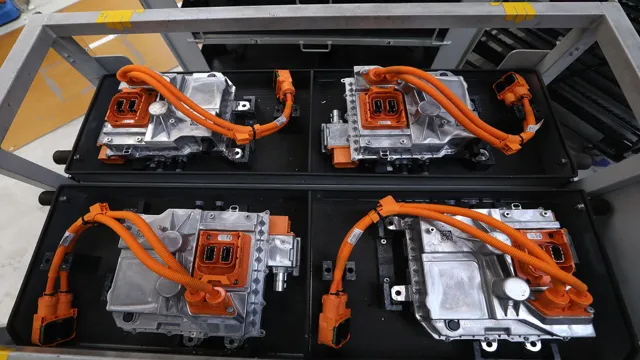Revolutionary Electric Car Battery Breakthrough of 2019: A Game Changer for Sustainable Transportation
Have you ever wished that your electric car battery had a longer lifespan? Well, there’s some good news for you! The year 2019 has brought along new electric car battery breakthroughs that could drastically improve the longevity of your EV battery. The breakthrough is related to the energy density of the battery cells, which determines the amount of electricity that can be stored per unit of the mass of the battery. Currently, most electric cars use lithium-ion batteries to power their vehicles.
However, the latest electric car battery technology involves using new materials, such as silicon, in the battery’s anodes. Silicon has the potential to store much more energy than graphite, which is currently used in most lithium-ion batteries. This breakthrough will improve the energy density of the battery cells and boost the driving range of electric cars, making them a more practical and viable option for long-distance travel.
Furthermore, the new battery technology will allow the battery to charge at a faster rate than current EVs. Tesla’s Supercharger station, for instance, currently takes about 45 minutes to recharge to 80% capacity. With the new battery technology, it could take as little as 10 to 15 minutes to charge to the same level, making long road trips possible with electric cars.
This breakthrough in electric car battery technology marks a significant step forward in advancing electric cars’ practicality and reducing our dependence on fossil fuels. The benefits of this technology will undoubtedly be seen in the near future as electric car manufacturers begin incorporating it into their vehicles. So, get ready for extended EV battery life and shorter charging times, as the future of driving is becoming a reality with these breakthroughs.
Background on Electric Car Batteries
Electric car battery technology has come a long way since its inception in the 1800s, but recent breakthroughs in 2019 have propelled it even further. One such development is the solid-state battery, which replaces the typical liquid electrolyte with a solid material, making it safer and more efficient. Several car manufacturers, including Toyota and BMW, are investing heavily in the development of this technology, with the hope that it will increase electric car range and reduce charging time.
Another exciting innovation is the lithium-sulfur battery, which has the potential to double the range of electric cars while also being more affordable than current battery technology. These breakthroughs in electric car battery technology are crucial in the ongoing effort to reduce emissions and create a more sustainable future.
Current State of Electric Car Batteries
When it comes to electric vehicles, the battery is the key component that powers them. The development of these batteries has come a long way since the very first electric cars. The early EVs used bulky and heavy lead-acid batteries that weren’t very efficient and had a short range.
Nowadays, lithium-ion batteries are the most commonly used battery type in EVs. These batteries have a high energy density, meaning they can store more energy in a smaller size. Additionally, they have a longer lifespan and can be charged in a shorter amount of time.
The current state of electric car batteries is that they provide a much better driving experience compared to the early days of EVs. The range has increased, the charging times have decreased, and the batteries are becoming less expensive to produce. The future of EV batteries looks bright, with new technologies being developed such as solid-state batteries, which are even more efficient than lithium-ion batteries.
Overall, the development of electric car batteries has been impressive, and it’s only going to get better from here.
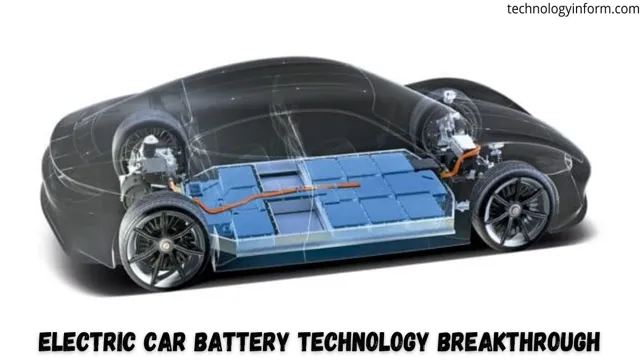
Importance of Battery Breakthroughs
Electric car batteries have become increasingly popular in recent years. The rise in demand for electric vehicles has put pressure on manufacturers to develop batteries that are more efficient, durable, and reliable. There have been several breakthroughs in electric car battery technology, including advanced lithium-ion batteries and solid-state batteries.
These innovations have led to longer battery life, faster charging times, and increased range for electric cars. The importance of battery breakthroughs in the electric car industry cannot be overstated. Without these breakthroughs, the mass adoption of electric vehicles would not be possible.
As battery technology continues to evolve, we can expect even more significant advancements that will make electric cars a more viable option for drivers around the world.
Recent Developments in Electric Car Battery Technology
Electric car battery breakthroughs in 2019 have brought about significant advancements in the way we power our vehicles. One such development is the use of solid-state batteries, which offer higher energy densities and faster charging times than traditional lithium-ion batteries. Researchers in Japan have created a solid-state battery that has a higher energy density and can be charged in just 10 minutes, making electric cars more practical for everyday use.
Another innovation is the use of silicon in lithium-ion batteries, which can increase their energy storage capacity by as much as 40%. These breakthroughs mean that electric cars are becoming more viable alternatives to gas-powered vehicles, with longer ranges and quicker charging times. The future of electric cars is looking brighter with these new technologies, making them accessible to more people than ever before.
New Materials and Compositions
Electric car battery technology has come a long way over the years, especially in recent times with the development of new materials and compositions. One of the most significant breakthroughs in this field is the use of lithium-ion batteries, which offer higher energy density and longer lifespan compared to traditional lead-acid batteries. But that’s just the beginning.
Researchers are constantly experimenting with new materials and compositions to make electric car batteries even better. For instance, some are exploring the use of solid-state electrolytes, which could offer higher conductivity and faster charging times. Others are working on developing new cathode materials to improve the energy density of the batteries.
Overall, the goal is to make electric cars more reliable and efficient, while also reducing their environmental impact. With these recent developments, it’s clear that electric car battery technology is poised for an exciting future.
Improved Energy Density and Charging Speeds
Electric car battery technology has been improving at an unprecedented rate, primarily in terms of energy density and charging speeds. With the development of advanced lithium-ion batteries and solid-state batteries, electric vehicles can now have a longer driving range with higher energy density. Furthermore, solid-state batteries offer a faster charging time and an increased lifespan.
As a result, electric cars are becoming more practical for everyday use, and the growing popularity of electric vehicles is driving further research and development in battery technology. It’s incredible to think that these advancements will enable electric cars to eventually surpass the range and convenience offered by traditional gasoline-powered vehicles. With the potential to fully charge a car battery in minutes, future electric vehicle users will be able to travel long distances without any range anxiety or stoppages.
It is an exciting time for the automotive industry and environmentally conscious drivers looking to do their part in reducing carbon emissions.
Increased Lifespan and Durability
Electric Car Battery Technology The recent developments in electric car battery technology have led to an increased lifespan and durability of these batteries. With this technological advancement, electric cars can now travel longer distances, provide better performance, and have a stronger battery life. Lithium-ion batteries have a higher energy density and can store more energy, making them ideal for electric cars since they require a lot of energy to run.
However, one of the challenges faced with lithium-ion batteries is their tendency to degrade over time. The good news is that recent breakthroughs have focused on enhancing the durability and lifespan of these batteries. With extensive research and development, manufacturers have discovered a way to reduce the rate of degradation of these batteries, leading to an increased lifespan and more dependable batteries.
This means that electric cars can now offer better performance and range, making them a more practical option for car owners who want to save money on fuel and reduce their environmental impact. In summary, the developments in electric car battery technology have allowed for an increased lifespan and durability of these batteries, making them a more viable option for many car owners.
Implications for Electric Cars and the Environment
The electric car battery breakthrough in 2019 has had a significant impact on the environment and the future of electric vehicles. With the new battery technology, electric cars can now cover longer distances without needing to be charged as often. This has not only improved the overall convenience of electric vehicles, but it has also made them more practical for long-distance traveling.
Additionally, the breakthrough has led to a reduction of greenhouse gas emissions, as electric cars produce zero emissions while driving. This has contributed to the overall efforts in reducing global warming and promoting a clean energy future. With this new battery technology, humanity is now one step closer to developing sustainable transportation that reduces our reliance on fossil fuels while improving the quality of our environment.
The electric car battery breakthrough in 2019 is a significant milestone that has set the stage for future innovation in this field.
Increased Adoption and Improved Range
As electric cars gain momentum and increase adoption worldwide, one crucial factor that determines the feasibility and effectiveness of these eco-friendly vehicles is their range. As electric cars are driven, their battery levels gradually drop, and the car’s range decreases. However, the advent of improved battery technology has led to the development of electric vehicles with longer ranges, making them more viable for everyday use.
With increased ranges, electric cars can travel longer distances comfortably, enabling drivers to undertake longer trips without worrying about running out of power. This technology’s advancements have significant implications for the environment, as these vehicles reduce carbon emissions, promoting a cleaner and greener future for generations to come.
Reduced Environmental Impact
The rise of electric cars has significant implications for the environment. One of the most notable benefits is the reduced environmental impact of these vehicles. Unlike traditional gas-powered cars, electric cars do not produce tailpipe emissions that contribute to air pollution.
This means that electric cars can help to reduce air pollution, which is a major contributor to climate change, respiratory illnesses, and other health problems. In addition to reducing air pollution, electric cars are also more energy-efficient than gas-powered cars. This means that they require less energy to travel the same distance, which can help to reduce our overall energy consumption and lower our carbon footprint.
Overall, the increased use of electric cars has the potential to significantly reduce our environmental impact and help to create a more sustainable future.
Looking Ahead to the Future of Electric Cars
The electric car industry has been making tremendous strides in recent years, with more and more drivers considering making the switch from traditional gas-powered vehicles. One of the key factors driving this shift has been the promise of increasingly efficient and powerful electric car batteries. In fact, 2019 has already seen some major breakthroughs in battery technology, with researchers around the world working to develop new materials and designs that can increase the range, lifespan, and performance of electric car batteries.
With breakthroughs in areas such as solid-state batteries and lithium-sulfur batteries, experts predict that the future of electric cars is looking brighter than ever. As we look ahead to the coming years, it’s clear that electric cars will continue to play a major role in shaping the future of transportation, and the development of new battery technologies will be a crucial part of that story.
Conclusion
After years of research and development, the electric car industry has finally hit the jackpot with a breakthrough in battery technology. This breakthrough has unlocked the potential for longer ranges, faster charging and ultimately, more accessible and sustainable transportation for everyone. With this new technology, electric cars are no longer the quirky novelty on the streets, but instead, the practical and wise solution for the future of mobility.
So, let’s all charge up and hit the road, because the electric revolution is here to stay!”
FAQs
What is the latest breakthrough in electric car battery technology?
The latest breakthrough in electric car battery technology is the development of solid-state batteries which are smaller, less flammable and more efficient than the existing lithium-ion batteries.
How much more efficient are solid-state batteries in electric cars?
Solid-state batteries can provide up to three times more energy density than conventional lithium-ion batteries, which means they can offer longer range and better performance in electric cars.
When are solid-state batteries expected to be available for electric cars?
Solid-state batteries are still in the development stage and are not expected to be available for commercial use in electric cars until the mid-2020s.
Will the new solid-state batteries reduce the cost of electric cars?
While the new solid-state batteries may eventually reduce the cost of electric cars, they are initially expected to be more expensive due to the cost of research, development, and scaling up production.
